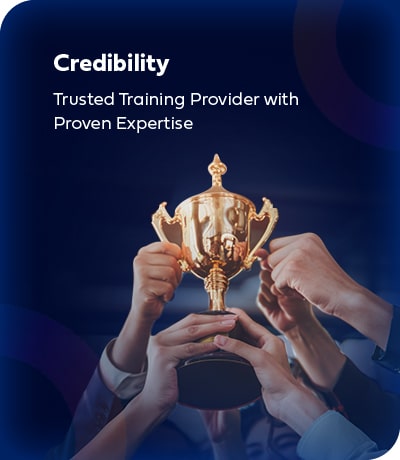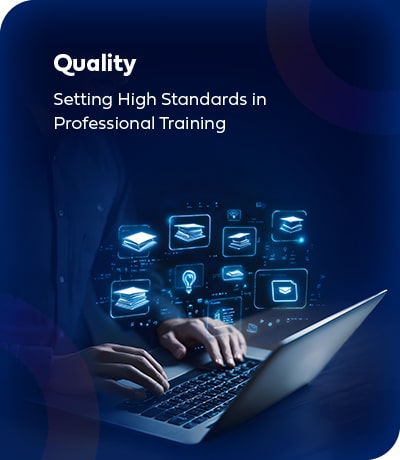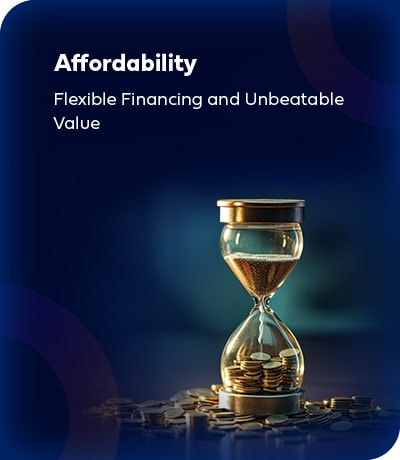
Heat up your career with our 

Online Course
Start learning immediately
1,236 Students enrolled
Price Match
Guarantee

3 months instalments of: £348.33
6 months instalments of: £174.17
9 months instalments of: £116.11
12 months instalments of: £87.08

By submitting this form, you agree to e-Careers processing your data in line with our Privacy Policy
The CIMA Professional Management Level is the intermediate level in the CIMA's CGMA Professional Qualification, which focuses on performance, cost and management analysis, and compliance to reporting frameworks to help decision-making processes at the mid-management level.
This CIMA qualification allows you to take on management roles and increases your professional recognition to employers, businesses, and organisations.
If you have relevant qualifications or experience and are an active CGMA candidate, this CIMA Management Level training is your key to completing the qualification and becoming a successful Chartered Global Management Accountant!
Upon completing the qualification, the Chartered Institute of Management Accountants (CIMA), the leading institute for management accountants worldwide, will award you the designatory letters CIMA Adv Dip MA.
CIMA Professional Management Level positions you for finance roles such as Financial Accountant, Finance Manager, Management Accountant, and Management Consultant. You can also work towards more senior job roles such as Finance Director, Chief Finance Officer, CEO, and Finance Business Partner.
Our CIMA Management Level online course offers you the following:
Access to industry-leading eLearning platform.
CIMA-approved training course materials.
Support from award-winning, industry-expert Tutors.
A collection of digital resources.
Kaplan physical study books.
Interactive course content.
Interest-free payment options.
Best price guaranteed on like-for-like courses.
Support from an organisation that has trained over 630,000 students.
The CIMA Management Level is the intermediate level of the CGMA Qualification. This level equips you with knowledge, tools, and techniques to make informed decisions on a mid-management level of the organisation. Our course provides comprehensive support to help you master these three subjects and pass all your exams.
Managing Performance (E2)
Managing Performance is the subject representing the Enterprise pillar of the CGMA Professional. This subject explores tools, concepts, and techniques to optimise performance and meet the organisation's goals.
You'll learn to measure performance, track progress, analyse performance data, and implement strategies to align the organisation's performance to its goals.
Some of the expected learning outcomes for this subject are the following:
Learn the fundamentals of business models and how new business and operating models can be developed to improve the performance of organisations.
Discover how different leadership styles can be used to improve the performance of individuals to achieve organisational goals.
Master how to use performance management concepts and techniques to implement strategies effectively and efficiently.
Master project management concepts and techniques that are useful in implementing strategies. (Project management is linked to capital investment decision-making, which is covered in P2).
For this subject, the key concepts that you'll learn are:
Business models and value creation.
Managing people's performance.
Managing projects.
Advanced Management Accounting (P2)
Advanced Management Accounting represents the Performance pillar of the CGMA Professional. This subject builds on the foundational knowledge established at the Operational Level and equips you with the advanced skills and techniques needed to make strategic financial decisions.
You'll learn to analyse data, apply business economics concepts, evaluate options, and make informed recommendations that drive organisational success.
Some of the expected learning outcomes for this subject are the following:
How to use cost, quality, process, and value management to provide organisations with cost advantage.
Discover the criteria, processes, and techniques to decide which projects to undertake.
Learn how to manage the performance of organisational units to ensure that they achieve their objectives.
Learn how to analyse risks and uncertainties that organisations face in the medium term, especially capital investment decision-making, and manage those risks in implementing such decisions.
For this subject, the key concepts that you'll learn are:
Managing the costs of creating value.
Capital investment decision-making.
Managing and controlling the performance of organisational units.
Risk and control.
Advanced Financial Reporting (F2)
Advanced Financial Reporting is the subject representing the Financial pillar of the CGMA Professional. This subject builds on the core knowledge of financial reporting established at the Operational Level and focuses on advanced financial reporting practices that meet international accounting standards.
You'll also learn how to source funds for the organisation's projects and apply advanced financial reporting standards imposed by the Integrated Reporting Framework.
Some of the expected learning outcomes for this subject are the following:
Identify the sources and types of funds and how much they cost.
Master the key financial reporting standards on which financial statements will be based and apply those standards to prepare group accounts.
Learn more about the International Integrated Reporting Framework, its components, and how to analyze financial statements and their limitations.
For this subject, the key concepts that you'll learn are:
Financing capital projects.
Financial reporting standards.
Group accounts.
Integrated reporting.
Analysing financial statements.
Format
CIMA Professional Management Level requires you to pass three objective tests and a case study exam before earning the qualification.
The objective tests are multiple-choice and computer-based, assessing all the component learning outcomes covered in this course. The case study exam is also computer-based and covers all the knowledge, skills, and techniques across the three subjects and assesses how you apply them to real-world situations.
Duration
Below are the duration for each exam at this level:
Managing Performance (E2): 90 minutes.
Advanced Management Accounting (P2): 90 minutes.
Advanced Financial Reporting (F2): 90 minutes.
Case Study Synoptic Exam: 3 hours.
Availability
All exams from this level are available via the awarding body and can be taken at 5,500 Pearson VUE centres across 178 countries worldwide. You can take the objective exams on demand, while the case study is only available in four windows throughout the year. We'll provide you with all the support and resources you need to prepare for your exams.
You'll need an active student subscription to sit your exams. Annual student subscriptions and exam fees are separate from the course price.
Objective tests are computer-marked, so you'll receive your provisional results within 48 hours. Case study, on the other hand, is human-marked, so it'll take 6 to 8 weeks before you can receive the results from this exam.
Our CIMA Management Level training course is ideal for finance professionals seeking to develop their careers further in business accounting roles. As a CGMA candidate currently pursuing the qualification, you can enrol in this course and continue progressing towards earning the chartered status.
To study the CIMA Professional Management Level, we recommend that you:
Are a CGMA delegate currently undertaking the CGMA Qualification journey.
Complete the Operational Level of CIMA Professional.
Have a solid understanding of the English language.
Are comfortable with basic Mathematics.
Have access to a PC or laptop (This course is compatible with both Mac and Windows).
While this qualification is delivered online, we also include the textbooks to assist you with your studies.
Most comprehensive course training at the most affordable price.
Professional recognition: Upon completing the Management Level, you will earn your CIMA Adv Dip MA and receive designatory letters demonstrating your prowess and expertise in accounting and management.
Comprehensive eLearning platform: Access an industry-leading eLearning platform with all the support and learning materials you need and a user-friendly interface for easy navigation.
Responsive Tutor support: Request unlimited support from award-winning tutors who aim to assist you with your learning and respond to you within 24-48 hours.
Interactive course content: Our interactive course content, consisting of engaging slides, videos, animations, and more, can help you better engage with the lessons. It can be found on our eLearning platform.
Exam preparation materials: Be prepared for your CIMA examinations with our exam preparation materials, which include pocket revision kits, mock exams, practice papers, question banks, and exam preparation guides.
Flexible learning: Study at your own pace as you can access the course in our eLearning platform for 12 months.
Physical study books: Gain additional learning insights as we provide you with CIMA-accredited textbooks to match your learning preferences.
Interest-free payment options: Our interest-free payment options make your education more accessible so you can study the course and start your learning journey without worries.
Available CIMA courses: Continue your learning path with our wide range of CIMA training courses.
TOTUM Pro Card: Shop with discounts using TOTUM Pro Card, which offers discounts in selected stores and websites.
How valuable is a CIMA qualification?
CIMA qualifications are a great addition to your professional toolkit.
The Chartered Institute of Management Accountants (CIMA) is the most prominent professional body for Management Accountants. Employers highly recognise CIMA, with 96% of FTSE 100 firms employing CIMA-qualified individuals.
CIMA qualifications are worth earning because you'll gain essential skills and professional recognition that open up career opportunities across different countries and industries. Graduates enter the industry with access to various opportunities, including Management, Accounting, Finance, and Consultative roles.
What is a CIMA Professional Qualification equivalent to?
Completing all levels of CIMA Professional and earning the CGMA designation is equivalent to a Master's Degree or Level 7 qualification. This means you demonstrate a high level of knowledge, skills, and commitment to management accounting.
Is CIMA qualified as a Chartered Accountant?
After completing the CIMA Professional Qualification, you'll be awarded the designatory letters, ACMA and CGMA, and become a respected Chartered Management Accountant in the finance sector. These finance professionals are vital in providing financial information and analysis to support business decision-making.
How difficult is the CIMA Management Level?
The CIMA Management Level may have challenging assessments and case study examinations, but with the right support and resources, you can pass all exams and continue working towards the coveted CGMA designation.
At e-Careers, our comprehensive CIMA Management Level online course will provide you with all the support you need for this level.
How many papers are there at the CIMA Management Level?
CIMA Professional Management Level has three objective tests and a case study exam that you must pass before earning the qualification. Each objective test is computer-based, has a multiple-choice format, and will have an exam duration of 90 minutes. Meanwhile, the case study synoptic exam is also computer-based and will have an exam duration of 3 hours.
What should I do next after I have completed the CIMA Management Level?
After completing the Management Level of CIMA Professional Qualification, you'll gain the designatory letters, CIMA Adv Dip MA, which you can use in your professional career. You're also eligible to take the next level of the qualification, CIMA Professional Strategic Level.
What jobs can I apply for after my CIMA Management Level?
After achieving your CIMA Management Level, you will receive the CIMA Dip Adv MA designatory letters. While studying for the CIMA Management Level, you can apply for job roles related to accounting and finance.
Some of these positions include:
Finance Analyst
Financial Analysts research and analyse financial data to guide businesses and individuals in their investment and financial decisions.
Cost Accountant
Cost Accountants analyse and allocate the business' costs to optimise resource efficiency and profitability.
Project Accounting Manager
Project Accounting managers collaborate with departments and teams to ensure accurate budgeting, risk management, cost control, and project financial stability.
Management Accountant
A Management Accountant conducts thorough financial analysis and applies accounting principles to support organisational leaders in decision-making.
Financial Accountant
Financial Accountants are responsible for preparing financial reports that are accurate, complete, and adhere to accounting standards.
Finance Managers
Finance Managers have varying roles depending on the size of the organisation. Their core responsibility, however, is to oversee the company's financial health.







